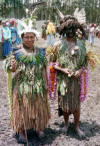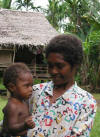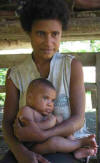 |
It’s a jungle out there... |
 |
Most places in PNG have no road access. You can, however, get there by
helicopter... or maybe, if you are brave, fit, and very bold, by foot. |
 |
Thank God for helicopters and pilots dedicated to the work of Bible
translation! |
 |
Some remote places have airstrips that allow fixed-wing aircraft to land. |
 |
This Kingair B200 has been used to save at least one girl’s life by taking
her to Australia for medical help not available in PNG. It also shuttles many
Bible translators and support workers around. |
 |
There are other modes of transportation in PNG, too, like hand-made
canoes. |
 |
The Highlands Highway is paved and smooth in some places. You do need to
drive carefully, however, expecting the unexpected. Normally, you drive on the
left in PNG, but in some cases, you make exceptions. |
 |
Public Motor Vehicles (PMVs) may be busses, boats, or (more commonly)
pickup trucks or flatbed trucks packed with people. This one is not filled to
capacity. I know that because I took the picture just after one person got off
of the truck. You might think that riding in the back of an unpadded pickup
truck on bumpy dirt roads would be uncomfortable. You would be right. It
sometimes beats walking, though. Usually there are more people on foot than
driving on the roads in rural PNG. |
 |
The back of our truck is much more comfortable, with padded seats and a
roof to keep the rain and hot sun off of our heads-- at least if 3 or fewer
people ride in back. Nate, Ben, and Evan like it better there than in the twin
cab. |
 |
Sometimes PMV boats get loaded like their pickup truck counterparts. |
 |
Here is Lori teaching a high school class at Ukarumpa International School
(UIS). Here the teachers (including Lori) don’t get paid a salary for their work, but
they must raise support just like the Bible translators and other support
workers whose children they teach. This allows the MKs to get a quality
education at a first-rate Christian school with reasonable tuition. It also
enables Bible translators to focus more on their Bible translation work and
less on the education of their own children. |
 |
Michael works on Bible translation software development while living with
a community of Bible translators. He also provides consulting services related
to linguistic and Bible translation software. |
 |
Lori leads a weekly Bible study for national women using the Tok Pisin
trade language. |
 |
Here are some of our church friends at Dylup Station on the North Coast
Road in Madang Province. Michael preaches there from time to time. |
 |
This couple named their little baby girl “Lori” in honor of the sweet lady
on the left. |
 |
Between the local people and the missionaries from various countries, we
live in a very culturally and racially diverse Christian community. We also
have some cute kids for neighbors. |
 |
In the highlands, where we live, the major cash crop is coffee. It is
usually grown on small, family-operated farms. Here is some of the early
processing of coffee berries, done entirely without electricity. |
 |
Different people groups have different ideas of what “getting dressed up”
means. The lady on the left is a good friend of ours. She is growing in
her Christian walk. |
 |
This man is holding a New Testament in his own language (Nyndrou, Manus
Island) on the day it was dedicated and distributed. There are hundreds more
language groups in Papua New Guinea still waiting for the New Testament in
their own language. |
 |
Dedication of a New Testament is cause for celebration, usually involving
traditional “sing-sing” dancing. These dancers are celebrating the dedication
of the New Testament in their own (Bargam) language in Madang Province. |
 |
Marta and her child, Bulal Village |
 |
Alek’s wife, Ba'e Village, Eastern Highlands Province |
 |
Augustine’s wife and child, Bulal Village, Madang Provice |
 |
Mountains near Ukarumpa with some of the morning mist still hanging around |
 |
Morning quiet time view, Ukarumpa |






















